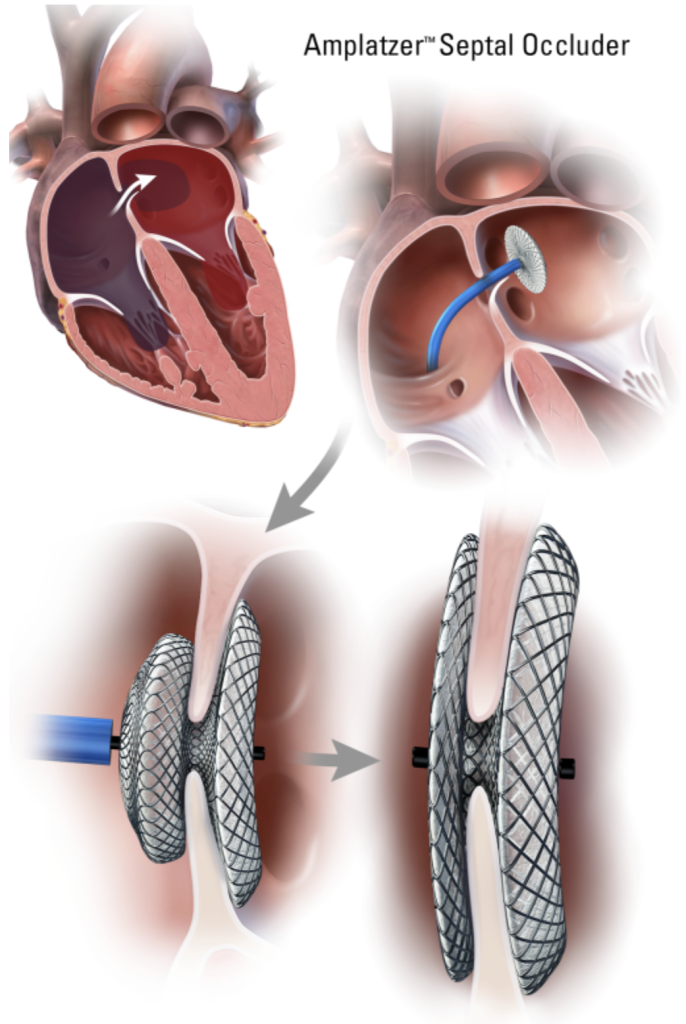Atrial septal defect
Overview
An atrial septal defect (ASD) is a hole in the heart between the upper chambers (atria) and causes a communication between these 2 chambers of the heart. As a result, the venous and arterial blood are mixed together. This condition is congenital, meaning it is present from birth. An ASD can occur as an isolated defect, or it can be part of complex congenital heart defects.
7% of all congenital heart defects are ASDs, and are 30-40% of all congenital heart diseases diagnosed in patients aged 40 or older. There are 4 types of ASD, which are categorized based on their location, with the ostium secundum defect, also known as the patent foramen ovale (PFO), as the most common at around 75% of all cases of ASD.
Symptoms
Many babies born with atrial septal defects have no signs or symptoms. Signs or symptoms usually begin in adulthood, though often this condition is asymptomatic. In some cases, a patient may experience shortness of breath, fatigue, irregular heartbeats, migraines, and episodes of stroke.
Diagnosis
If you or your child have any symptoms of an ASD, your medical team may recommend imaging studies. These include an echocardiogram, a transesophageal echocardiogram, and cardiac magnetic resonance imaging (CMR).
An echocardiogram uses ultrasound to create images of the beating heart. An echocardiogram can assess if the heart chambers and valves are healthy or damaged.
Transesophageal echocardiograms give a more detailed picture of the heart structures. Your doctor will use a small probe, which is inserted through the mouth down into the tube that connects your mouth to your stomach (the esophagus). Patients undergoing this exam will be given a light sedation to help make them as comfortable as possible.
Magnetic resonance imaging (MRI) uses powerful magnetic fields to build a detailed image of the cardiovascular system. This is a non-invasive test which can provide lots of information on the condition of your heart. It can help your medical team evaluate the anatomy and function of the heart chambers, heart valves, size and blood flow through major vessels, and the surrounding structures such as the pericardium. It is used to diagnose a variety of cardiovascular disorders, including anomalies like ASD.
Treatment
Treatment for ASD depends on how much the defect affects your heart function. Most patients with PFO do not require any specific treatment, and monitoring is recommended.
In some cases where the hole is large and the oxygen levels in your blood are lower, or if you experience any symptoms, the heart-team, which will consist of cardiologists and cardiac surgeons, will recommend an invasive treatment. Medications, such as blood thinners (anticoagulants), can minimize the risk of blood clots.
If the ASD is at risk of causing complications, the heart-team will recommend the insertion of a closure device. It is possible to close the hole through a precuraneous procedure, where our interventional cardiologist inserts a small wire in the groin and guides a device between the heart chambers. The device is then opened up, which closes the hole.


In more complex cases, when is not possible to use a closure device, surgical repair is recommended. After a consultation, a cardiac surgeon will arrange all the necessary tests prior to the operation. During the operation, the patient undergoes general anesthesia. The surgeon then patches the hole using a biological membrane, which is sutured between the heart chambers. In some cases, the cardiac surgery team may be able to perform minimally invasive heart surgery, where smaller incisions than those made for open-heart surgery, are used. After the operation, the patient will stay in our cardiac intensive care ward for a few days while they recover, then they will be transferred to our regular ward. The average hospital stay after a surgical ASD closure is 5-7 days, but this varies depending on the patient’s pre-operative clinical condition.
Why GMI
At the GMI, we have a state-of-the-art facility for patients affected by cardiac diseases, which includes our Cardiovascular Diagnostic Center, Cardiology Catheterization Laboratory, Cardiac Surgery Theatre, Hybrid Theatre and Cardiac Intensive Care Unit.
Our team of internationally recognized heart doctors (cardioradiologists, cardiologists, cardiac surgeons and cardioanaesthetist) will guide you through the whole process, from your diagnostic work-up to your treatment and post-treatment care. We are committed to providing the best treatment options to each of our patients. The GMI team will never offer a simple “one size fits all” approach to any patient. We believe each patient’s case is as individual as they are and strive to find the best solution for each of our patients, taking their specific case and diagnosis, their lifestyle, and choices into account.



